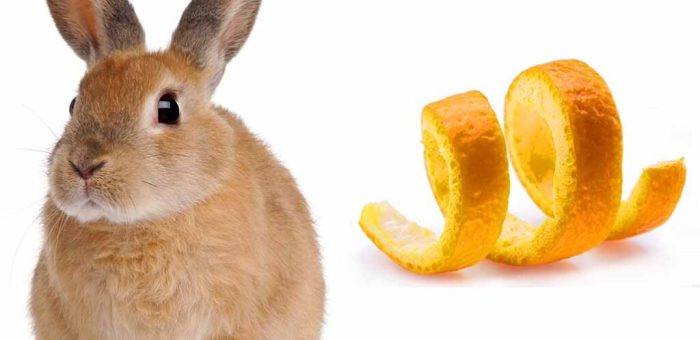Rabbits are adorable and curious creatures that have specific dietary needs. As responsible pet owners, it’s crucial to understand what foods are safe and beneficial for our furry friends. One common question that arises is whether rabbits can indulge in the zesty treat of orange peels.
This guide will delve into the nutritional value, potential risks, and consumption guidelines for orange peels in a rabbit’s diet.
Orange peels, while fragrant and flavorful to humans, may pose certain considerations for rabbits. Let’s explore the implications of orange peel consumption on a rabbit’s health and well-being.
Health Implications

Orange peels contain various compounds that can impact a rabbit’s health. While some components may be beneficial, others pose potential risks.
Toxic Compounds
Orange peels contain limonene, a citrus oil that can irritate a rabbit’s digestive tract. Excessive consumption can lead to vomiting, diarrhea, and abdominal pain. Additionally, orange peels contain psoralens, which can cause skin irritation and photosensitivity.
Beneficial Compounds
Despite these risks, orange peels also contain beneficial compounds. They are a good source of vitamin C, which supports immune function and overall health. Orange peels also contain antioxidants, such as flavonoids, which help protect against oxidative damage.
Digestive Impact
Orange peels are high in fiber, which can be beneficial for a rabbit’s digestive system. However, excessive consumption can cause digestive upset, including gas and bloating. It’s important to introduce orange peels gradually and in moderation to avoid these issues.
Nutritional Value
Orange peels are a nutritious addition to a rabbit’s diet, containing a variety of vitamins, minerals, and fiber. Compared to other rabbit foods, such as hay and pellets, orange peels are a good source of vitamin C, potassium, and fiber.
Vitamins
Orange peels are a rich source of vitamin C, an essential nutrient for rabbits. Vitamin C is involved in various bodily functions, including immune system support, collagen production, and wound healing.
Minerals
Orange peels also contain several important minerals, including potassium, calcium, and magnesium. Potassium is essential for maintaining fluid balance and nerve function, while calcium is necessary for strong bones and teeth. Magnesium plays a role in energy production and muscle function.
Fiber
Orange peels are a good source of dietary fiber, which is important for maintaining a healthy digestive system. Fiber helps to regulate bowel movements and prevent gastrointestinal issues.
Consumption Guidelines
While orange peels offer some nutritional benefits for rabbits, it’s crucial to limit their consumption to ensure their well-being. Factors like age, size, and health status should be considered when determining appropriate intake guidelines.
Preparing and Offering Orange Peels
To safely offer orange peels to rabbits, follow these steps:
- Thoroughly wash the orange to remove any pesticides or chemicals.
- Peel the orange and remove all traces of white pith, as it contains bitter compounds that rabbits dislike.
- Cut the peel into small pieces to prevent choking hazards.
- Introduce orange peels gradually, starting with a small piece and monitoring your rabbit’s reaction.
Alternatives to Orange Peels
While orange peels may not be a suitable addition to a rabbit’s diet, there are several other sources of essential vitamins, minerals, and fiber that can be safely included.
These alternatives offer comparable nutritional value and are generally safer for rabbits to consume.
Hay and Grass
Hay and grass are excellent sources of fiber, which is crucial for maintaining a healthy digestive system in rabbits. Fiber helps regulate gut motility, prevent digestive issues, and promote dental health.
Hay should constitute the majority of a rabbit’s diet, while grass can be offered as a supplement or treat.
Leafy Greens
Leafy greens, such as romaine lettuce, spinach, and kale, are rich in vitamins, minerals, and antioxidants. They provide essential nutrients like vitamin A, vitamin C, and calcium.
Introduce leafy greens gradually into a rabbit’s diet to avoid digestive upset.
Fresh Vegetables
Certain fresh vegetables, including carrots, celery, and broccoli, can be offered as treats in moderation. These vegetables provide vitamins, minerals, and fiber, but should not be given in large quantities as they can cause digestive problems.
Closing Summary
In conclusion, while orange peels may provide some nutritional benefits, they should be offered to rabbits sparingly and under close supervision. It’s essential to prioritize a balanced diet tailored to a rabbit’s specific needs. By understanding the potential risks and benefits, we can make informed choices that contribute to the health and happiness of our beloved rabbits.
Questions and Answers
Can rabbits eat orange peels every day?
No, orange peels should not be a daily part of a rabbit’s diet due to their high sugar content and potential for digestive upset.
How much orange peel can a rabbit eat?
If you choose to offer orange peel as a treat, limit it to a small piece (about the size of a rabbit’s thumbnail) once or twice a week.
What are the alternatives to orange peels for rabbits?
Excellent sources of vitamins and fiber for rabbits include hay, fresh vegetables (such as leafy greens, carrots, and celery), and occasional fruits (such as apples and bananas).